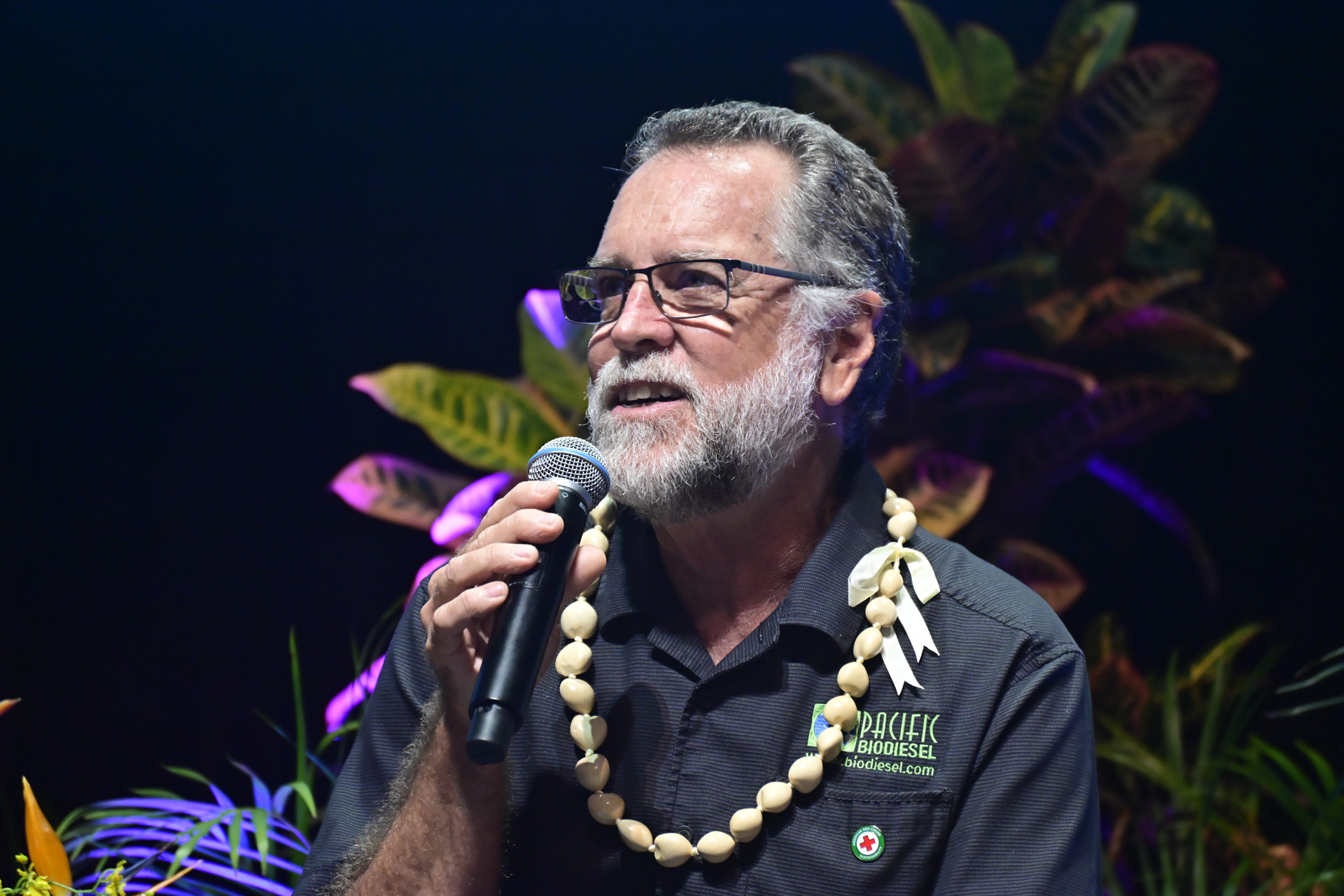Panel participants, L to R: Nicolas Rodier, Executive Director of Clean Energy and Innovation, Hawaii Gas; Bob King, President and Founder, Pacific Biodiesel; Jon Mauer, President & CEO, Island Energy Services; Eric Wright, President, Par Hawaii; and moderator, Julie Yunker, Director of Sustainability, Government and Community Affairs, Hawaii Gas. Photo courtesy of Maui Economic Development Board
Earlier this year, Pacific Biodiesel President and Founder Bob King presented at the 2024 Hawaii Energy Conference as a guest panelist for the session entitled, “Fueling the Future.”
The panel also included Jon Mauer, President & CEO, Island Energy Services; Nicolas Rodier, Executive Director of Clean Energy and Innovation, Hawaii Gas; and Eric Wright, President, Par Hawaii. The panel discussion was focused on understanding the differences between biodiesel, renewable diesel, renewable natural gas, and other biofuels and addressed the question, ‘Can these fuels really help with resilience and do they lower carbon emissions?’
As noted in King’s introduction by moderator Julie Yunker, of Hawaii Gas, Pacific Biodiesel has been producing biodiesel for almost 30 years.

Pacific Biodiesel President and Founder Bob King, addressed the 11th annual Hawaii Energy Conference.
Today, the company’s Hawaii Island refinery is anually producing 6 million gallons of biodiesel. “We’ve been using used cooking oil, although less than half the capacity of the plant is all that we can source locally, so we bring in waste oils and tallow from the west coast,” noted King. “The goal is to replace that with feedstock that we grow here in Hawaii to get back to 100% Hawaii-sourced feedstock.”
“With our success and lessons learned on Maui, we are moving to Kauaʻi, hopefully getting to 1,000 acres this year. We use no herbicides, or pesticides ever; we also haven’t used any fertilizer on this one – so I believe we are carbon negative. We farm with biodiesel, our crushing mill runs on hydro power, so no fossil inputs for this oil,” King said.
King noted some of the challenges and uncertainties with current federal incentives. “The biodiesel tax credit expires at the end of this year and may not be in place until the first or second quarter of 2025. The EPA continues to underestimate the amount of gallons the renewable industry can make in liquid biofuels, then adding more products like renewable diesel and SAF to that volume,” he explained. “They’re not adding gallons – they’re trading, which is not how we need to expand biodiesel and renewable fuels in my mind. If we’re going to solve this issue we’ve got to add more new things instead of taking them away.”
“These are big, expensive projects. You can’t finance these things for one or two years,” he said. “We need to know what the government is going to do for ten years with surety.”
King pointed out a recent University of Southern California report on the Life Cycle Assessment of an electric bus versus biodiesel bus in Honolulu. “Their preliminary report shows that biodiesel buses demonstrate a substantial reduction in environmental impact, consuming 48% less energy and 89% less water consumption, 41% less greenhouse gas, and 7% less total cost of ownership compared to their electric counterparts.”
“I’m not saying let’s don’t do electric. I’m saying to remember that we need all of these things. Don’t throw out the things that are working and actually very cost effective and correct for the environment. We have to be careful how we spend our energy money. As these new technologies emerge, and I’m still rooting for biodiesel, let’s bring everything new into the mix instead of displacing the older pieces.”
“If we’re going to get there by 2045, we can’t start in 2040. These are expensive, elaborate projects, even the farming. It takes years to get land into production, get the systems set up, get the equipment. We’re not going to turn this thing off and on quickly,” King concluded.
Watch the full panel presentation “Fueling the Future” below.
Photos and video courtesy of Maui Economic Development Board.

